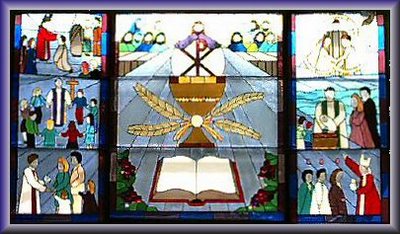
A sacrament is a Christian rite that mediates divine grace - a holy mystery.
In the Western tradition, it is often defined as an outward, visible sign that conveys an inward, spiritual grace.
The Latin word sacramentum had its origin as the oath of allegiance taken by Roman soldiers; hence, a sacred ceremony used to impress an obligation; a solemn oath-taking; an oath.
Among many Protestants, the word mediates or conveys would mean only that it is a visible symbol or reminder of invisible grace.
Roman Catholics, Eastern Orthodox Christians, the Oriental Orthodox, Assyrian Christians, members of the Anglican, United Methodist, and Old Catholic traditions, the Independent Catholic Churches and Lutherans hold that sacraments are not mere symbols, but rather, "signs or symbols which effect what they signify", that is, the sacraments in and of themselves, rightly administered, are used by God as a means to communicate grace to faithful recipients.
Generally, there are seven sacramental rites used since apostolic times in the Church, though not all of them are accepted as such by all groups. These are: Baptism, Chrismation ( or Confirmation ), the Eucharist (Communion), The Sacrament of Order (Ordination), Reconciliation of a Penitent, Anointing of the Sick, and Matrimony. Some groups do not consider any of these to be sacraments. Some groups, such as Anglicans and Old-Catholics, consider the two dominical sacraments of the Gospel, Baptism and the Eucharist, to be the "precepted, primary, and principal sacraments ordained for our salvation," and consider the other five sacramental rites to be "lesser sacraments" that are derivative of these two. Occasionally, Christians who do not believe in sacramental theology will nevertheless refer to, for example, marriage as a "sacrament" in an effort to underscore their belief in the sanctity of the institution.
Clearly, Christian churches, denominations, sects are divided regarding the number and operation of the sacraments, but they are generally held to have been instituted by Jesus. Those who do not believe in sacramental theology refer to these rites -- or, at least, those rites which they use --primarily baptism and communion, as "ordinances." The sacraments are usually administered by the clergy to a recipient or recipients, and are generally understood to involve visible and invisible components. The invisible component (manifested inwardly) is understood to be brought about by the action of the Holy Spirit, God's grace working in the sacrament's participants, while the visible (or outward) component entails the use of such things as water, oil, and bread and wine that is blessed or consecrated; the laying-on-of-hands; or a particularly significant covenant that is marked by a public benediction (such as with marriage and absolution).
No comments:
Post a Comment